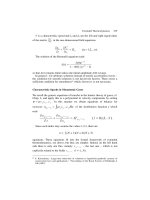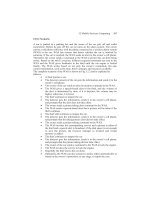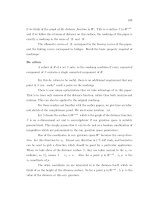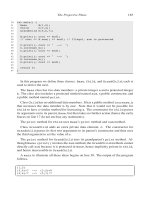Economic Policy Thoughts for Today and Tomorrow phần 9 pdf
Bạn đang xem bản rút gọn của tài liệu. Xem và tải ngay bản đầy đủ của tài liệu tại đây (698.47 KB, 12 trang )
84 ECONOMIC POLICY
that we will not expropriate them nor socialize them for
ten years, perhaps even for a longer time." And he
thought this was an invitation to come to India!
The problem—as you know—is domestic capital accu-
mulation. In all countries today there are very heavy
taxes on corporations. In fact, there is double taxation
on corporations. First, the profits of corporations are
taxed very heavily, and the dividends which corpora-
tions pay to their shareholders are taxed again. And this
is done in a progressive way.
Progressive taxation of income and profits means that
precisely those parts of the income which people would
have saved and invested are taxed away. Take the ex-
ample of the United States. A few years ago, there was
an "excess-profit" tax, which meant that out of one dol-
lar earned, a corporation retained only eighteen cents.
When these eighteen cents were paid out to the share-
holders, those who had a great number of shares had to
pay another sixty or eighty or even greater percent of it
in taxes. Out of the dollar of profit they retained about
seven cents, and ninety-three cents went to the govern-
ment. Of this ninety-three percent, the greater part
would have been saved and invested. Instead, the gov-
ernment used it for current expenditure. This is the pol-
icy of the United States.
I think I have made it clear that the policy of the
United States is not an example to be imitated by other
countries. This policy of the United States is worse than
bad—it is insane. The only thing I would add is that a
rich country can afford more bad policies than a poor
country. In the United States, in spite of all these meth-
ods of taxation, there is still some additional accumula-
tion of capital and investment every year, and therefore
Foreign Investment
85
there is still a trend toward an improvement of the stand-
ard of living.
But in many other countries the problem is very criti-
cal.
There is no—or not sufficient—domestic saving, and
capital investment from abroad is seriously reduced by
the fact that these countries are openly hostile to foreign
investment. How can they talk about industrialization,
about the necessity to develop new plants, to improve
conditions, to raise the standard of living, to have higher
wage rates, better means of transportation, if they are
doing things that will have precisely the opposite effect?
What their policies actually accomplish is to prevent or
to slow down the accumulation of domestic capital and
to put obstacles in the way of foreign capital.
The end result is certainly very bad. Such a situation
must bring about a loss of confidence, and there is now
more and more distrust of foreign investment in the
world. Even if the countries concerned were to change
their policies immediately and were to make all possible
promises, it is very doubtful that they could once more
inspire foreign capitalists to invest.
There are, of course, some methods to avoid this con-
sequence. One could establish some international stat-
utes,
not only agreements, that would withdraw the for-
eign investments from national jurisdiction. This is
something the United Nations could do. But the United
Nations is simply a meeting place for useless discus-
sions.
Realizing the enormous importance of foreign in-
vestment, realizing that foreign investment alone can
bring about an improvement in political and economical
world conditions, one could try to do something from
the point of view of international legislation.
This is a technical legal problem, which I only men-
86 ECONOMIC POLICY
tion,
because the situation is not hopeless. If the world
really wanted to make it possible for the developing
countries to raise their standard of living to the level of
the American way of life, then it could be done. It is only
necessary to realize how it could be done.
What is lacking in order to make the developing coun-
tries as prosperous as the United States is only one thing:
capital—and, of course, the freedom to employ it under
the discipline of the market and not the discipline of the
government. These nations must accumulate domestic
capital, and they must make it possible for foreign capi-
tal to come into their countries.
For the development of domestic saving it is necessary
to mention again that domestic saving by the masses of
the population presupposes a stable monetary unit. This
implies the absence of any kind of inflation.
A great part of the capital at work in American enter-
prises is owned by the workers themselves and by other
people with modest means. Billions and billions of sav-
ing deposits, of bonds, and of insurance policies are op-
erating in these enterprises. On the American money
market today it is no longer the banks, it is the insurance
companies that are the greatest money lenders. And the
money of the insurance company is—not legally, but
economically—the property of the insured. And practi-
cally everybody in the United States is insured in one
way or another.
The prerequisite for more economic equality in the
world is industrialization. And this is possible only
through increased capital investment, increased capital
accumulation. You may be astonished that I have not
mentioned a measure which is considered a prime
method to industrialize a country.
I
mean protectionism.
But tariffs and foreign exchange controls are exactly the
Foreign Investment
87
means to
prevent
the importation of capital and industri-
alization into the country. The only way to increase in-
dustrialization is to have more capital. Protectionism can
only divert investments from one branch of business to
another branch.
Protectionism, in
itself,
does not add anything to the
capital of a country. To start a new factory one needs
capital. To improve an already existing factory one
needs capital, and not a
tariff.
I do not want to discuss the whole problem of free
trade or protectionism. I hope that most of your text-
books on economics represent it in a proper way. Protec-
tion does not change the economic situation in a country
for the better. And what
certainly
does not change it for
the better is labor unionism. If conditions are unsatisfac-
tory, if wages are low, if the wage earner in a country
looks to the United States and reads about what is going
on there, if he sees in the movies how the home of an
average American is equipped with all modern com-
forts,
he may be envious. He is perfectly right in saying:
"We ought to have the same thing." But the only way
to obtain it is through an increase in capital.
Labor unions use violence against entrepreneurs and
against people they call strikebreakers. Despite their
power and their violence, however, unions cannot raise
wages continually for all wage earners. Equally ineffec-
tive are government decrees fixing minimum wage rates.
What the unions do bring about (if they succeed in rais-
ing wage rates) is permanent, lasting unemployment.
But unions cannot industrialize the country, they can-
not raise the standard of living of the workers. And this
is the decisive point: One must realize that all the poli-
cies of a country that wants to improve its standard of
living must be directed toward an increase in the capital
88 ECONOMIC POLICY
invested per capital. This per capita investment of capital
is still increasing in the United States, in spite of all of
the bad policies there. And the same is true in Canada
and in some of the West European countries. But it is
unfortunately decreasing in countries like India.
We read every day in the newspapers that the popula-
tion of the world is becoming greater, by perhaps 45
million people—or even more—per year. And how will
this end? What will the results and the consequences be?
Remember what I said about Great Britain. In 1750 the
British people believed that six million constituted a tre-
mendous overpopulation of the British Isles and that
they were headed for famines and plagues. But on the
eve of the last world war, in 1939, fifty million people
were living in the British Isles, and the standard of living
was incomparably higher than it had been in 1750. This
was the effect of what is called industrialization—a
rather inadequate term.
Britain's progress was brought about by increasing
the per capita investment of capital. As I said before,
there is only one way a nation can achieve prosperity: if
you increase capital, you increase the marginal produc-
tivity of labor, and the effect will be that real wages will
rise.
In a world without migration barriers, there would
be a tendency all over the world toward an equalization
of wage rates. If there were no migration barriers today,
probably twenty million people would try to reach the
United States every year, in order to get higher wages.
The inflow would reduce wages in the United States, and
raise them in other countries.
I do not have time to deal with this problem of migra-
tion barriers. But I do want to say that there is another
method toward the equalization of wage rates all over
Foreign
Investment 89
the world. This other method, which operates in the ab-
sence of the freedom to migrate, is the
migration
of capital.
Capitalists have the tendency to move towards those
countries in which there is plenty of labor available and
in which labor is reasonable. And by the fact that they
bring capital into these countries, they bring about a
trend toward higher wage rates. This has worked in the
past, and it will work in the future, in the same way.
When British capital was first invested in, let us say,
Austria or Bolivia, wage rates there were much, much
lower than they were in Great Britain. But this additional
investment brought about a trend toward higher wage
rates in those countries. And such a tendency prevailed
all over the world. It is a very well-known fact that as
soon as, for instance, the United Fruit Company moved
into Guatemala, the result was a general tendency to-
ward higher wage rates, beginning with the wages
which United Fruit Company paid, which then made it
necessary for other employers to pay higher wages also.
Therefore, there is no reason at all to be pessimistic in
regard to the future of "undeveloped" countries.
I fully agree with the Communists and the labor un-
ions,
when they say: "What is needed is to raise the
standard of living." A short time ago, in a book pub-
lished in the United States, a professor said: "We now
have enough of everything, why should people in the
world still work so hard? We have everything already."
I do not doubt that this professor has everything. But
there are other people in other countries, also many peo-
ple in the United States, who want and should have a
better standard of living.
Outside of the United States—in Latin America, and
still more in Asia and Africa—everyone wishes to see
conditions improved in his own country. A higher stand-
90 ECONOMIC POLICY
ard of living also brings about a higher standard of cul-
ture and civilization.
So I fully agree with the ultimate goal of raising the
standard of living everywhere. But I disagree about the
measures to be adopted in attaining this goal. What
measures will attain this end? Not protection, not gov-
ernment interference, not socialism, and certainly not the
violence of the labor unions (euphemistically called col-
lective bargaining, which, in fact, is bargaining at the
point
of a gun).
To attain the end, as I see it, there is only one way! It
is a slow method. Some people may say, it is too slow.
But there are no short cuts to an earthly paradise. It takes
time, and one has to work. But it does not take as much
time as people believe, and finally an equalization will
come.
Around 1840, in the western part of Germany—in
Swabia and Wiirtemberg, which was one of the most
industrialized areas in the world—it was said: "We can
never attain the level of the British. The English have a
head start, and they will forever be ahead of us." Thirty
years later the British said: "This German competition,
we cannot stand it; we have to do something against it."
At that time, of course, the German standard was rapidly
rising and was, even then, approaching the British stan-
dard. And today the German income per capita is not
behind that of Great Britain at all.
In the center of Europe, there is a small country, Swit-
zerland, which nature has endowed very poorly. It has
no coal mines, no minerals, and no natural resources.
But its people, over the centuries, have continually pur-
sued a capitalistic policy. They have developed the high-
est standard of living in continental Europe, and their
country ranks as one of the world's great centers of civi-
Foreign Investment
91
lization. I do not see why a country such as Argentina—
which is much larger than Switzerland both in popula-
tion and in size—should not attain the same high stan-
dard of living after some years of good policies. But—as
I pointed out—the policies must be good.
Politics and Ideas
In the Age of Enlightenment, in the years in which the
North Americans founded their independence, and a
few years later, when the Spanish and Portuguese colo-
nies were transformed into independent nations, the pre-
vailing mood in Western civilization was optimistic. At
that time all philosophers and statesmen were fully con-
vinced that we were living at the beginning of a new age
of prosperity, progress, and freedom. In those days peo-
ple expected that the new political institutions—the con-
stitutional representative governments established in the
free nations of Europe and America—would work in a
very beneficial way, and that economic freedom would
continuously improve the material conditions of man-
kind.
We know very well that some of these expectations
were too optimistic. It is certainly true that we have ex-
perienced, in the nineteenth and twentieth centuries, an
unprecedented improvement in economic conditions,
making it possible for a much larger population to live at
a much higher standard of living. But we also know that
many of the hopes of the eighteenth century philosophers
have been badly shattered—hopes that there would not
be any more wars and that revolutions would become
unnecessary. These expectations were not realized.
93
94 ECONOMIC POLICY
During the nineteenth century, there was a period
when wars decreased in both number and severity. But
the twentieth century brought a resurgence of the war-
like spirit, and we can fairly well say that we may not
yet be at the end of the trials through which mankind
will have to go.
The constitutional system that began at the end of the
eighteenth and the beginning of the nineteenth century
has disappointed mankind. Most people—also most
authors—who have dealt with this problem seem to
think there has been no connection between the eco-
nomic and the political side of the problem. Thus, they
tend to deal at great length with the decay of parliamen-
tarianism—government by the representatives of the
people—as if this phenomenon were completely inde-
pendent of the economic situation and of the economic
ideas that determine the activities of people.
But such an independence does not exist. Man is not
a being that, on the one hand, has an economic side and,
on the other hand, a political side, with no connection
between the two. In fact, what is called the decay of
freedom, of constitutional government and representa-
tive institutions, is the consequence of the radical change
in economic and political ideas. The political events are
the inevitable consequence of the change in economic
policies.
The ideas that guided the statesmen, philosophers and
lawyers who, in the eighteenth century and in the early
nineteenth century developed the fundamentals of the
new political system, started from the assumption that,
within a nation, all honest citizens have the same ulti-
mate goal. This ultimate goal, to which all decent men
should be dedicated, is the welfare of the whole nation,
Policies and Ideas
95
and also the welfare of other nations—these moral and
political leaders being fully convinced that a free nation
is not interested in conquest. They conceived of party
strife as only natural, that it was perfectly normal for
there to be differences of opinion concerning the best
way to conduct the affairs of state.
Those people who held similar ideas about a problem
cooperated, and this cooperation was called a party. But
a party structure was not permanent. It did not depend
on the position of the individuals within the whole social
structure. It could change if people learned that their
original position was based on erroneous assumptions,
on erroneous ideas. From this point of view, many re-
garded the discussions in the election campaigns and
later in the legislative assemblies as an important politi-
cal factor. The speeches of members of a legislature were
not considered to be merely pronouncements telling the
world what a political party wanted. They were re-
garded as attempts to convince opposing groups that the
speaker's own ideas were more correct, more beneficial
to the common weal, than those which they had heard
before.
Political speeches, editorials in newspapers, pam-
phlets, and books were written in order to persuade.
There was little reason to believe that one could not
convince the majority that one's own position was abso-
lutely correct if one's ideas were sound. It was from this
point of view that the constitutional rules were written
in the legislative bodies of the early nineteenth century.
But this implied that the government would not inter-
fere with the economic conditions of the market. It im-
plied that all citizens had only one political aim: the
welfare of the whole country and of the whole nation.









